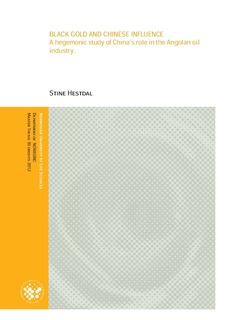| dc.description.abstract | China has since the end of the Angolan civil war in 2002 been an important partner in
rebuilding Angola and expanding the infrastructure throughout the country, making
Angola a more integrated and predictable country. The Chinese economy has at the
same time experienced a thriving economic growth while the US has been
experiencing the opposite. This has led to a shift in the international system in which
the US hegemony is challenged while China gains momentum as a growing world
power. In light of the Neo-Gramcian theory of hegemony, this study examines these
shifts in the international state structure as well as the rise of a Chinese hegemony in
Africa, particularly in Angola and its oil industry in which China has high stakes as an
investor and importer. However, despite the intense Chinese investment in the oil
industry in Angola, this research shows, in line with the issue-area assumption about
foreign policy, that China does in fact not exert significant power or influence in the
oil industry in Angola. | no_NO |
